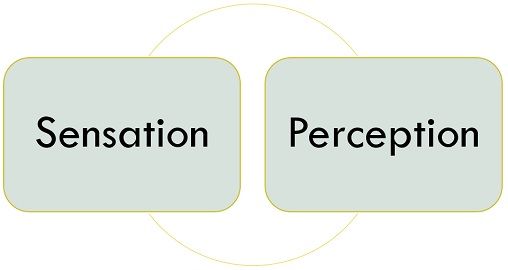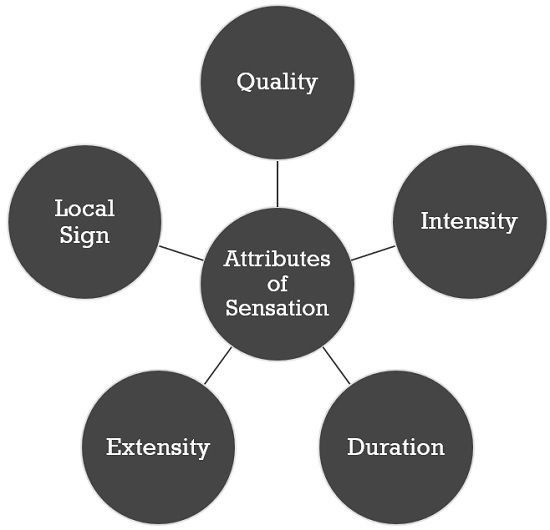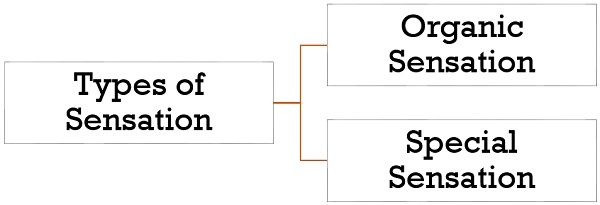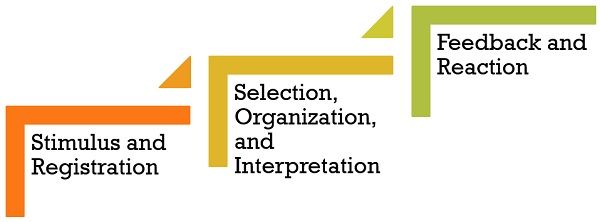 Do you know our sensory organs i.e. eyes, nose, ears, tongue, skin, etc. provide fresh information about the inside and the outside world? The primary experience of a stimulus identified by a specific sensory organ is called sensation. With this process, the information from the external world reaches our brain.
Do you know our sensory organs i.e. eyes, nose, ears, tongue, skin, etc. provide fresh information about the inside and the outside world? The primary experience of a stimulus identified by a specific sensory organ is called sensation. With this process, the information from the external world reaches our brain.
On the other hand, the process with which we interpret the sensations experienced by us in our day-to-day life and then we act upon them is called perception. In this process, an individual identifies, interprets, and gives meaning to the information supplied by sensory organs.
In general, we interchange the words ‘sensation and perception’ because these are cognitive processes, but there is a fine line of difference between these two in the sense that in the case of sensation, we don’t have to engage in the occurrence of the process actively, whereas perception is the interpretation of the information received through sensations. Hence, it is a mental activity that introduces us to the situation by providing direct knowledge of the same.
Contents: Sensation Vs Perception
Comparison Chart
| Basis for Comparison | Sensation | Perception |
|---|---|---|
| Meaning | Sensation refers to that process through which our sense organs receive information from the environment. | Perception implies the process through which the brain selects, integrates, organizes, and interprets sensory information. |
| What does it do? | Provides raw data | Develops into our experiences |
| Source | Stimuli received from sensory organs. | Information is provided to the brain. |
| Results in | Perception | Action or change in attitude |
| Deals with | Rudimentary behavior that greatly depends on physiological functioning. | Complex and the process is cognitive and psychological. |
| Stimuli | Makes an individual aware of the stimuli. | Gives meaning to the stimuli. |
| What is active during the process? | Only sensory organs of the person are active | All parts of the body become active. |
| Sequence | First | Second |
| Example | Activation of the ear to hear a sound is a sensation. | Inference of what is being heard is perception. |
Definition of Sensation
Sensation implies the way a human’s special sensory receptors and nervous system obtains and represents stimulus energies from our environment. It is the first response of a physical sensory organ or an organism to stimuli or we can say that it activates the function of these organs. It is a physical condition or experience resulting from the stimulation of sensory organs. It is a process of detecting and encoding a number of physical stimuli.
It is the instant experience of stimulus attributes like hot, cold, soft, loud, etc, resulting from the stimulation of a sensory organ. It takes place when the receptors in the sensory organs are active, through which different forms of outside stimuli become neural signals in the brain.
So we can say that sensation is a cognitive process through which our nervous system and sensory receptors gather and represents stimulus energy from the physical environment.
What is Transduction?
The process that transforms external stimuli into neural activity is termed transduction.
Attributes of Sensation
There are five attributes of sensation:
- Quality: Sensations vary in terms of quality, i.e. each sensation has its own quality. Further, sensations gathered through different sensory organs can be different. In fact, sensations received from the same sensory organ can also be different.
- Intensity: The degree of strength or intensity of the sensation can also be different. Further, the intensity of a sensation relies on the objective strength of the stimulus as well as the mental state of the person.
- Duration: The duration of sensation is based on the continuity of the stimulus or its effect.
- Extensity: It implies voluminousness, range, or magnitude of sensation is a spatial attribute. As the extensity increases, the sensation seems to be immense.
- Local Sign: Different sensations are differentiated as per the spot stimulated, called a local sign. This is due to the fact that varied local signs which a person can differentiate among sensations possessing similar quality, intensity, duration, and extensity.
Types of Sensation
The two basic types of sensation are:
- Organic Sensation: Sensations that result from the conditions of the internal organs, is called organic sensations. Hence, such sensations do not require any external stimulation. For example, thirst results in organic sensation, arising from drying up of the membrane present at the back of the neck.
- Special Sensation: Special Sensations are the sensations resulting from the specific sense like eyes, ears, tongue, nose, and skin. Such sensations can be differentiated from one another and originate from external stimuli.
Also Read: Difference Between Illusion and Hallucination
Definition of Perception
In simple words, perception can be understood as something which is experienced by way of intuition. Perception is a process that helps individuals organize and interpret their sensory impressions so as to add meaning to the data received. It is the meaningful interpretation of the data provided by the senses to the brain.
Nevertheless, it is also true, what a person perceives, may or may not be the same as the end reality. Everyone’s approach towards life is different and his behavior greatly depends on his perception.
It is a cognitive process that encompasses filtering or modifying the raw data received out of sensation to which an individual makes sense of the stimuli present in the environment, which can affect all senses. The basis of classifying stimuli is past events, feelings, and motives.
It is the primary source of a person’s knowledge about the external world and so his behavior is highly dependent on what he perceives about himself and the world surrounding him. It can also be defined as the way in which a person experiences the world.
Qualities of Perception
- It lies between sensation and response.
- The process is internal in nature.
- It is an active process.
- It is a partially inborn and partially acquired process.
- It can be subjective as well as objective.
Perceptual Process
- Stimulus and Registration: Perception starts when the individual experiences the stimulus situation. It takes place when a person encounters a stimulus or situation, which can be immediate sensual stimulation or total physical and socio-cultural environment. However, the actual beginning of this process is the registration which is actually the recognition. At this stage, the physiological organs both sensory or neural are affected.
- Selection, Organization, and Interpretation: When the person receives information, the sub-processes of selection, organization, and interpretation are started. In selection, only those stimuli are taken into consideration that are relevant and appropriate for the person. On the other hand, the organization is related to shaping the perceived inputs and transforming the same into a meaningful shape or form. Lastly, Interpretation deals with the drawing of inferences out of observed meaning from the perceived input.
- Feedback and Reaction: It is the resultant behavior of the person, which can be overt i.e. in the form of actions, or covert i.e. in the form of change in attitudes. The perceiver’s behavior generates responses as per the situation and such responses result in a new set of inputs.
Also Read: Difference Between Hearing and Listening
Key Differences Between Sensation and Perception
After understanding the meaning of these two terms, let’s take a look at the difference between sensation and perception:
- The sensation is the response of the person’s sensory organs to the events that take place in the environment. There are five senses i.e. hearing, touch, smell, vision, and taste, which constantly receive stimuli, which can be internal or external to the human body. Conversely, perception is all about correlating, integrating, and comprehending various sensations and information from sensory organs through which an individual recognizes things and objects.
- While sensation provides raw data, perception develops it into our experience.
- The sensation is the initial impression accumulated by sense organs. And on interpreting this impression, when some meaning is added to it, it turns out as perception.
- Sensation ends with the beginning of perception, whereas the end result of perception is the action or change in the person’s attitude.
- Sensation deals with the elementary behavior of the person that is based on physiological functioning or biological process. In contrast, a perception is a complex form of these simple experiences and so the process is cognitive and psychological.
- The sensation is something that makes an individual aware of the stimuli, whereas perception gives meaning to the stimuli.
- During the process of sensation, only the sensory organs of the individual are active. But, during the process of perception, all the parts of the body become active.
- The sensation is the initial conscious response of the brain to the stimuli or it can be understood as the first step in the direction of perception, whereas perception is the second or say direct response to the sensation and an indirect response to the physical stimulus.
Example
- Perception of a flower encompasses the experience of sensation such as its color, smell, and touch.
- Perception of broccoli involves the experience of sensations such as taste, color, and touch.
Concept of Sensation and Perception
At the time of the birth of a child, the infant lacks sensation and perception, as his/her organs are not developed completely. Due to which the infant is not able to differentiate between things and understand their meaning. However, with the passage of time, as the infant grew older, he comes to know the distinction between people and objects as well as he can also distinguish family members from strangers or outsiders.
Further, when the child uses his sense organs, he comes to know about the things that surround him and starts asking questions. Gradually, the perception ability develops over time, as he passes through adolescence.
Also Read: Difference Between Attitude and Behaviour
Conclusion
The two terms, sensation and perception are regarded as material aspects of the mental development of a person. And none of the two are possible without the other one. While sensations are the constituents and basic element of perception, perception of the outside world that hinges on sensation.








Caalaa says
You are good